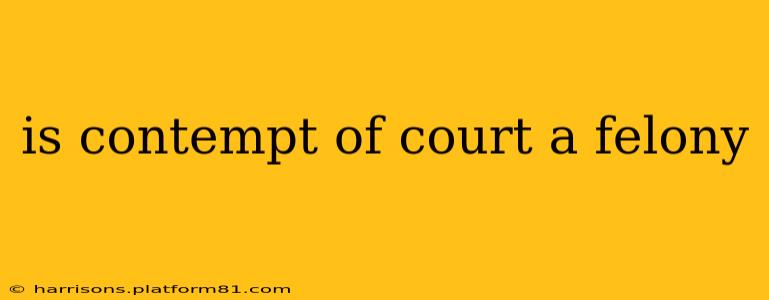Is Contempt of Court a Felony? A Comprehensive Guide
Contempt of court is a serious offense, but whether it's a felony or a misdemeanor depends heavily on the circumstances. It's not a simple yes or no answer, as the severity of the charge varies significantly based on jurisdiction, the nature of the offense, and the judge's discretion. This guide will explore the nuances of contempt of court, helping you understand its potential ramifications.
What is Contempt of Court?
Contempt of court broadly refers to any act that obstructs or interferes with the administration of justice within a court of law. This can manifest in various ways, including:
-
Direct Contempt: This occurs in the presence of the court, such as refusing to obey a judge's order, disrupting court proceedings, or showing disrespect towards the judge or court officials.
-
Indirect Contempt (Constructive Contempt): This happens outside the courtroom, such as failing to comply with a court order (like failing to pay child support or appearing for a hearing).
Is Contempt of Court Always a Felony?
No, contempt of court is not always a felony. It can be either a misdemeanor or a felony, depending on several factors. The most significant determinant is the severity of the offense and the potential impact on the judicial process.
A minor instance of indirect contempt, such as a minor procedural oversight, might be treated as a misdemeanor, resulting in fines or a short jail sentence. However, more serious acts of direct contempt, particularly those involving deliberate defiance of a court order or intentional disruption of proceedings, could be classified as felonies, leading to more substantial penalties, including lengthy prison sentences.
What are the Penalties for Contempt of Court?
Penalties for contempt of court vary widely based on the specific circumstances and jurisdiction. Possible penalties include:
-
Fines: Monetary penalties can range from small amounts to significant sums, depending on the severity of the offense.
-
Jail Time: Jail sentences can range from a few days to many years, with felony contempt often resulting in much longer sentences.
-
Community Service: This may be imposed as an alternative or in addition to other penalties.
-
Probation: The offender may be placed on probation with specific conditions to be met.
What Factors Determine the Severity of the Charge?
Several factors influence whether contempt of court is classified as a misdemeanor or a felony:
-
Jurisdiction: State and federal laws differ significantly in their definitions and penalties for contempt of court. What constitutes a felony in one jurisdiction may be a misdemeanor in another.
-
Intent: Deliberate and willful disobedience is far more likely to result in a felony charge than unintentional or inadvertent non-compliance.
-
Impact on Judicial Proceedings: The extent to which the contempt affected the court's ability to function efficiently significantly influences the severity of the charge. A major disruption is more likely to lead to a felony than a minor inconvenience.
-
Prior Convictions: A history of contempt charges can increase the likelihood of a more severe penalty for subsequent offenses.
How to Avoid Contempt of Court
The best way to avoid contempt of court is to fully understand and comply with all court orders and procedures. If you have questions or concerns about a court order, you should immediately seek legal advice from a qualified attorney. Failing to understand or comply with an order is no excuse. Respectful conduct and adherence to court rules are paramount to avoiding this serious offense.
H2: What are the differences between civil and criminal contempt?
Civil contempt typically involves the failure to comply with a court order that benefits a private party. The primary purpose is to coerce compliance with the order, often through fines or imprisonment until compliance is achieved. Criminal contempt, on the other hand, involves actions that obstruct the court's ability to function, and the punishment is primarily punitive—designed to punish the offender. The distinction is crucial because it impacts the type of hearing, the burden of proof, and the potential penalties.
H2: Can I represent myself in a contempt of court case?
While you have the right to represent yourself (pro se), it's strongly advised against it, especially in contempt of court cases. These cases can be complex, and a lack of legal expertise can significantly harm your defense. Contempt charges can result in serious consequences, making competent legal representation crucial.
H2: What constitutes disrespectful behavior in court?
Disrespectful behavior in court varies, but generally includes actions like outbursts, using profane language, ignoring the judge's instructions, or refusing to cooperate with court officials. Even seemingly minor acts of disrespect can be considered contempt, so maintaining decorum is essential.
This information is for educational purposes only and should not be considered legal advice. If you are facing contempt of court charges, consult with an attorney immediately.
